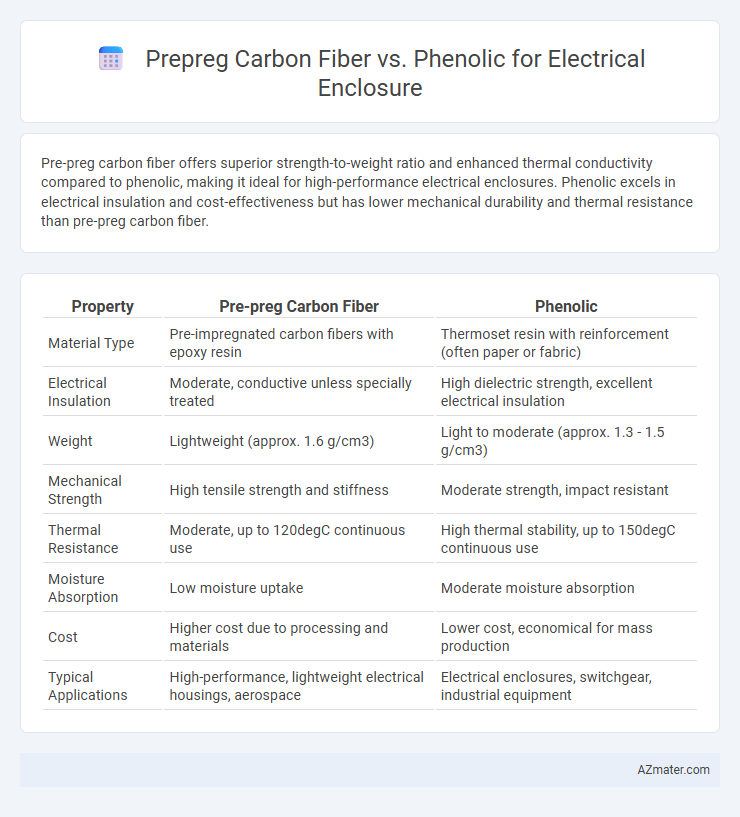Pre-preg carbon fiber offers superior strength-to-weight ratio and enhanced thermal conductivity compared to phenolic, making it ideal for high-performance electrical enclosures. Phenolic excels in electrical insulation and cost-effectiveness but has lower mechanical durability and thermal resistance than pre-preg carbon fiber.
Table of Comparison
| Property | Pre-preg Carbon Fiber | Phenolic |
|---|---|---|
| Material Type | Pre-impregnated carbon fibers with epoxy resin | Thermoset resin with reinforcement (often paper or fabric) |
| Electrical Insulation | Moderate, conductive unless specially treated | High dielectric strength, excellent electrical insulation |
| Weight | Lightweight (approx. 1.6 g/cm3) | Light to moderate (approx. 1.3 - 1.5 g/cm3) |
| Mechanical Strength | High tensile strength and stiffness | Moderate strength, impact resistant |
| Thermal Resistance | Moderate, up to 120degC continuous use | High thermal stability, up to 150degC continuous use |
| Moisture Absorption | Low moisture uptake | Moderate moisture absorption |
| Cost | Higher cost due to processing and materials | Lower cost, economical for mass production |
| Typical Applications | High-performance, lightweight electrical housings, aerospace | Electrical enclosures, switchgear, industrial equipment |
Introduction: Importance of Material Choice in Electrical Enclosures
Material selection in electrical enclosures critically impacts durability, thermal management, and electrical insulation performance. Pre-preg carbon fiber offers superior strength-to-weight ratio, excellent heat resistance, and enhanced electromagnetic shielding compared to phenolic composites, which are known for good electrical insulation and cost-effectiveness but lack advanced mechanical properties. Choosing the right material ensures optimal protection of sensitive electronic components, reduces maintenance costs, and improves operational reliability in demanding environments.
What is Pre-preg Carbon Fiber?
Pre-preg carbon fiber is a composite material made by pre-impregnating carbon fiber fabrics with a partially cured resin matrix, typically epoxy, which enhances mechanical strength and electrical insulation properties. This high-performance material offers superior stiffness, lightweight characteristics, and excellent thermal stability, making it ideal for electrical enclosures requiring durability and effective electromagnetic shielding. Compared to phenolic composites, pre-preg carbon fiber delivers enhanced impact resistance and precision in manufacturing, resulting in reliable protection for sensitive electrical components.
Understanding Phenolic Materials
Phenolic materials offer excellent electrical insulation and thermal stability, making them a popular choice for electrical enclosures in environments requiring flame resistance and mechanical durability. Unlike pre-preg carbon fiber, phenolic composites provide superior chemical resistance and cost-effective manufacturing for high-volume production. Their inherent low moisture absorption and high dielectric strength enhance reliability in harsh electrical applications.
Mechanical Strength Comparison
Pre-preg carbon fiber offers superior mechanical strength compared to phenolic resin for electrical enclosures, providing higher tensile strength and enhanced impact resistance. The fiber-reinforced composite structure of pre-preg carbon fiber delivers greater rigidity and durability, making it ideal for applications requiring robust protection against mechanical stresses. Phenolic materials, while cost-effective and flame-resistant, generally exhibit lower tensile strength and reduced fatigue resistance compared to advanced pre-preg carbon fiber composites.
Electrical Insulation Properties
Pre-preg carbon fiber offers excellent electrical insulation properties due to its high resin content and uniform fiber alignment, providing superior dielectric strength and minimal conductivity. Phenolic materials are known for their inherent electrical resistance and flame retardancy, making them reliable insulators in high-voltage environments. When choosing between the two for electrical enclosures, phenolic typically delivers better electrical insulation performance, while pre-preg carbon fiber excels in mechanical strength with adequate but lower insulation.
Thermal Resistance and Performance
Pre-preg carbon fiber offers superior thermal resistance compared to phenolic materials, withstanding temperatures up to 200degC without significant degradation. Its high thermal conductivity efficiently dissipates heat generated within electrical enclosures, enhancing overall performance and reliability. Phenolic, while cost-effective and electrically insulating, typically has a lower thermal resistance limit around 120degC, making it less suitable for high-heat applications.
Weight and Structural Efficiency
Pre-preg carbon fiber offers superior structural efficiency and significantly lower weight compared to phenolic materials, making it ideal for high-performance electrical enclosures where weight reduction is critical. Carbon fiber composites provide enhanced strength-to-weight ratios, enabling thinner walls and lighter components without compromising durability or protection. Phenolic enclosures, while cost-effective and chemically resistant, are considerably heavier and less stiff, which can limit design flexibility and increase overall system weight.
Corrosion and Chemical Resistance
Pre-preg carbon fiber offers superior corrosion resistance compared to phenolic materials, making it ideal for electrical enclosures exposed to harsh environments. Its tightly woven fibers and epoxy resin matrix provide excellent chemical resistance, preventing degradation from acids, alkalis, and solvents common in industrial settings. Phenolic, while cost-effective, tends to absorb moisture and chemicals over time, leading to reduced mechanical strength and potential enclosure failure.
Cost Considerations and Availability
Pre-preg carbon fiber offers superior strength-to-weight ratio and thermal stability for electrical enclosures but comes with a higher upfront cost and limited availability due to specialized manufacturing processes. Phenolic materials are more cost-effective and widely available, making them suitable for budget-conscious projects requiring excellent electrical insulation and flame resistance. Evaluating project scale and performance requirements helps determine whether the premium pricing of pre-preg carbon fiber justifies its benefits over phenolic options.
Application Suitability and Industry Use Cases
Pre-preg carbon fiber offers superior strength-to-weight ratio and excellent electromagnetic interference (EMI) shielding, making it ideal for high-performance electrical enclosures in aerospace, defense, and advanced telecommunications where durability and signal integrity are critical. Phenolic materials provide cost-effective electrical insulation, chemical resistance, and flame retardancy, widely used in industrial electrical enclosures for machinery, transformers, and control panels where thermal stability and regulatory compliance are essential. Industry applications prioritize pre-preg carbon fiber in environments demanding lightweight structural components with high mechanical properties, while phenolic is favored for rugged, economical solutions in heavy-duty electrical and electronic housing.

Infographic: Pre-preg Carbon Fiber vs Phenolic for Electrical Enclosure
 azmater.com
azmater.com